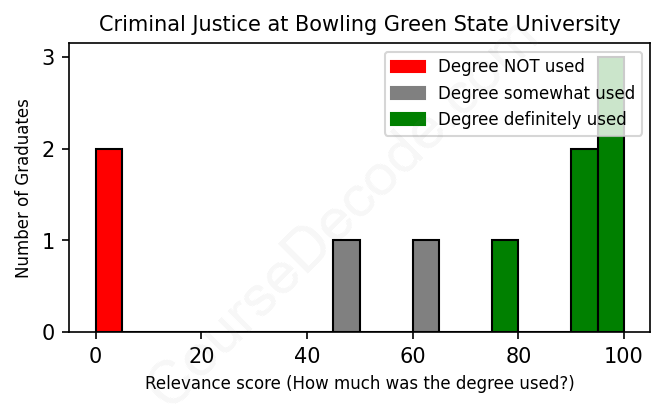
First, some facts. Of the Criminal Justice graduates from Bowling Green State University we've analyzed , here's how many have used (or NOT used) their degree in their career:

These are estimates based on AI analysis of 10 LinkedIn profiles (see below).
The verdict? On par with the average. Overall, with an average relevance score of 67%, Criminal Justice graduates from Bowling Green State University have about the same likelihood of finding work in this field as the average graduate across all fields:
And for comparison, here's the chart for all profiles we've looked at across all degrees.
Also, after graduating, only 30% of these graduates have pursued further education other than another Bachelor's degree (such as a Masters degree or other), compared to the average across all profiles of 35%. This suggests a Bachelors degree is enough for most Criminal Justice graduates, and it's normal to look for work straight after graduation.
See the details:
|
Relevance score: 92% We think this person has gone into a career highly relevant to their degree. We think this person has gone into a career highly relevant to their degree.
DEGREE INFOGraduated in 2020 from Bowling Green State University with a Bachelor of Science - BS in Criminal Justice. No other secondary education since. JOB HISTORY SINCE GRADUATIONLegal Intern Legal Aid of Western Ohio Jan 2020 - Apr 2020 Customer Service Representative  Robert Half Aug 2020 - Dec 2020 Case Management Specialist  Weltman, Weinberg & Reis Co., LPA Dec 2020 - Jul 2021 JCES clerk  Franklin County Court of Common Pleas Jul 2021 - Present ABOUTNo information provided. |
The top 10 most common jobs done by the graduates we've analyzed (ranked most common to least) are:
When looking at the career paths of Bowling Green State University graduates with a degree in Criminal Justice, it’s clear that many have pursued jobs that are either directly related to the field or at least touch upon aspects of criminal justice principles. Common roles include positions within law enforcement, such as Patrol Officers and Police Officers, which directly apply what these graduates learned during their studies. Additionally, many have found roles in juvenile justice settings, such as Youth Advisors and JCES Specialists, where they work closely with young offenders and apply both their academic knowledge and social understanding gained from their education.
However, not every job listed is closely related to the criminal justice field. Some graduates have ended up in completely unrelated roles, like retail management or customer service positions, which don’t utilize their criminal justice knowledge. While a handful of roles, like those in security or risk management, can be considered somewhat tangentially related to criminal justice, they often do not require the depth of understanding that the degree provides. Overall, many graduates do find relevant positions, but a significant number also venture into jobs that don’t leverage their education in criminal justice as much as one might expect.
Here is a visual representation of the most common words in job titles for Criminal Justice graduates (this is across all Criminal Justice graduates we've analyzed, not just those who went to Bowling Green State University):

Graduates from the Criminal Justice program at Bowling Green State University tend to pursue varied career paths, but many do find positions that are directly related to their degree. For instance, early in their careers, you'll often see them taking on internships or entry-level positions within law enforcement or juvenile justice, such as patrol officers, youth advisors, or workers in local juvenile courts. These types of jobs serve as foundational experiences that can help them build the skills and networks necessary for career advancement. Some graduates also branch out into related fields like security or compliance, although this often involves roles that may not fully utilize their criminal justice backgrounds.
Looking further down the road, about five to ten years post-graduation, many graduates find success in more specialized roles or ascend to managerial positions, especially within law enforcement or community services. However, there are also cases where graduates have transitioned away from criminal justice entirely, finding their niche in different sectors like security management or even non-related fields like retail and customer service, which may not feel as directly relevant to their studies. Overall, while a solid portion of graduates does remain in criminal justice-related careers, there are quite a few who veer off into other areas where their degree may not play as significant a role in their job functions. It paints a mixed picture—some graduates are thriving in their fields, while others are still searching for that perfect fit.
Honestly, a Bachelor’s degree in Criminal Justice at Bowling Green State University is pretty manageable for most students. It covers a mix of theory, policy, and some practical skills, but it’s not super hardcore like engineering or something. You’ll have your fair share of reading and writing assignments, especially when discussing criminal law and ethics, but if you stay organized and keep up with the material, you should be able to handle it pretty well. Overall, it's usually considered easier than more specialized degrees, so if you have a genuine interest in the field, you might find it enjoyable and not overly stressful!
Most commonly, in the LinkedIn profiles we've looked at, it takes people 4 years to finish a Bachelor degree in Criminal Justice.
So, when you look at these BGSU Criminal Justice grads and their job histories, it seems like they’ve each found their way into some pretty decent gigs, especially considering the range of entries in the field. While some of the early jobs like interns and resident supervisors probably didn’t pay a whole lot, many of them have moved into roles like police officers, program managers, and specialists that usually come with better salaries and benefits. For example, the people working at Amazon Web Services and some in law enforcement likely earn more than average, especially with the experience they’ve built up over the years. However, not every path looks like a money-making machine; some seem to have taken roles that might not pay as well, like substitute teaching. Overall, it appears that most of these grads have landed on their feet and are making a solid living in the long run!
Here is a visual representation of the most common words seen in the "about" section of LinkedIn profiles who have a Bachelor degree in Criminal Justice (this is across all Criminal Justice graduates we've analyzed, not just those who went to Bowling Green State University). This may or may not be useful:

Here are all colleges offering a Bachelor degree in Criminal Justice (ordered by the average relevance score of their Criminal Justice graduates, best to worst) where we have analyzed at least 10 of their graduates: